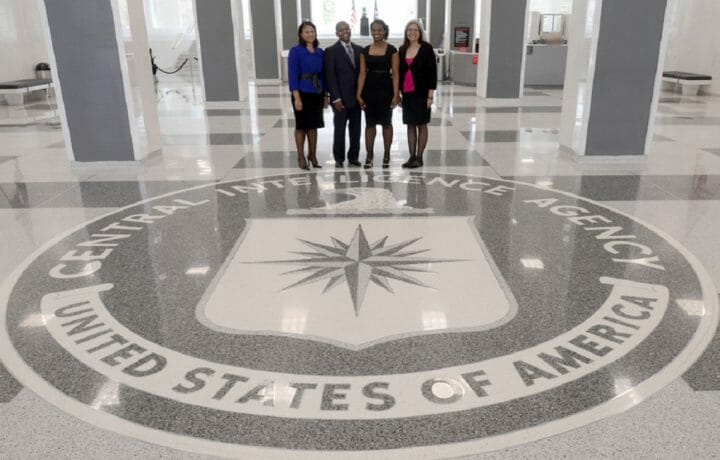By definition, America’s spies and their successes are hard to spotlight. But as Black History Month draws to a close, and beyond, the known contributions to American espionage by black men and women deserves recognition. Indeed, for four years now, the CIA has made efforts to do exactly that as part of a broad mandate by former Director John Brennan. The agency’s goal is to increase recruitment, retention, and promotions of minorities. The CIA has since implemented a long-term strategy to correct historical missteps. Though progress has been slow (in part because of the notoriously long slog to actually get hired and cleared by the agency), it has found some success.
Here are six black Americans who have served honorably at the CIA, and before the agency’s founding, in the field of espionage as a whole.
Ralph Bunche: Africa Analyst, Arab-Israeli War Arbitrator
Before Ralph Bunche earned the Nobel Peace Prize for mediating the Arab-Israeli war and achieving, ultimately, an armistice signed in 1949 (he was the first black American to earn the prize)—he worked for the Office of Strategic Services, the espionage predecessor to the CIA. At the OSS, he was a senior analyst of Africa affairs, and was later made chief of the Africa division. Bunche literally wrote the book on Africa political and economic conditions, which U.S. service members used when operating on the continent during World War II. After leaving the OSS, Bunche joined the State Department, eventually helping draft the United Nations charter in San Francisco.
Harriet Tubman: Underground Railroad and Civil War Spy
Harriet Tubman is best known for her work on the Underground Railroad, in which she made thirteen undercover incursions into slave states by night, freeing, ultimately, approximately seventy slaves, exfiltrating them to Canada and northern free states. Because the ex-slave knew the terrain and had proven her abilities to improvise, blend in, and act as a pathfinder—to say nothing of her proven heroism and mettle as a leader—when the Civil War broke out, Tubman was recruited by U.S. forces to hunt down Confederate camps and return intelligence on rebel troop movements. She built spy rings, and was later, according to Biography, “the only woman to organize and lead a military operation during the Civil War.” Her tombstone reads, fittingly: “Servant of God, Well Done.”
Wilbur Greene: Training Special Guerilla Units
During the Vietnam War, a military veteran named Wilbur Greene joined the Deputy Directorate for Plans (today the National Clandestine Service), where he helped organize and train Special Guerilla Units comprised of Hmong soldiers. He and other “assistant military attachés” lived with the SGUs from safe houses, and went out into the field with them for combat operations. They waged fierce warfare in southeast Asia. During his second tour, Greene was made Chief of Paramilitary Operations. He died there of complications from a medical procedure, and today has a star on the CIA Memorial Wall at Langley.
Mary Bowser: Used a photographic memory to spy on the white house
During the Civil War, a freed slave named Mary Bowser infiltrated the home of Jefferson Davis, the Confederate president. Bowser had been freed in her youth by Elizabeth Van Lew and Van Lew’s mother, and is thought to have received a formal education in Pennsylvania. (Records are spotty.) Bowser briefly traveled to Liberia as a missionary, but returned to the United States, where she was promptly arrested: charged with a Virginia law that prohibited educated blacks from entering the state. (When Van Lew learned of the arrest, she paid Bowser’s bail.) Bowser, who had a photographic memory, thus began using aliases to get around—abilities that would soon come in handy. When the Civil War erupted, Elizabeth Van Lew became a spy for the north, and recruited Bowser, who had by then found a way onto the servant staff of Jefferson Davis at the “Confederate White House.” While ostensibly cleaning the mansion, Bowser would read sensitive documents, memorize them, and report back to Van Lew, who passed the information to Union leaders. (Van Lew received personal thanks from Ulysses S. Grant.) After the war, Bowser started schools for former slaves, and gave cross-country lectures on her experiences as a Union spy.
Justin Jackson: Clandestine Service and diversity champion
Justin Jackson is the former deputy director of the National Clandestine Service of the CIA, and at the time of his retirement, was the highest ranking black American at the agency. He now works in the private sector. Though tight-lipped about his career, he spent sixteen years overseas—primarily in Europe and Latin American—working undercover. (According to one report, he is fluent in French, Portuguese, and Spanish.) After 9/11, he was one of the principals who helped the agency shift its posture from one of post-Cold-War ambiguity, to that of the spear tip in fighting the war on terror. Since retirement, he has pushed for greater diversity at the agency, working on (among other things), the diversity report that led to changes at the company.



